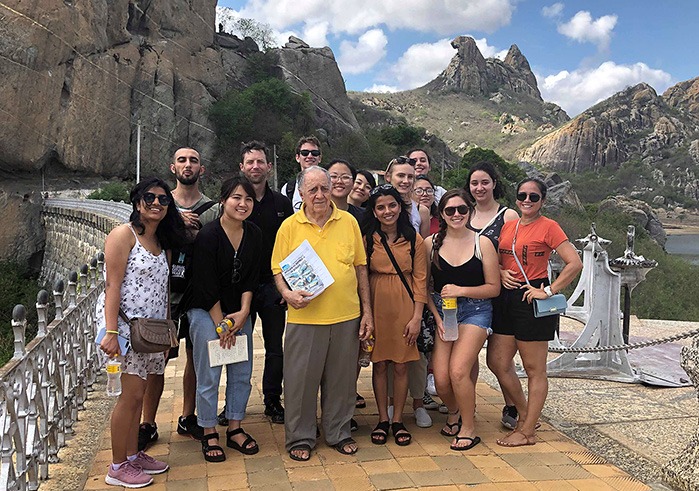Learning Cluster 2020: Students Investigate the Great Drought in Brazil

By Professor Ian Read
A great chronicler of the Brazilian backland, João Guimarães Rosa, famously wrote “good quality water is like health or freedom: it only has value when it runs dry.”
Over the course of 12 months, a group of students studied drought and water rights in Brazil. Such a topic may seem odd for the nation of Amazonian jungles and rivers, but Brazil has enormous regions that have long suffered from drought and water mismanagement. In January 2019, students were introduced to Brazilian history, society, and political economy through a close examination of the Grande Seca (Great Drought) that killed between 200,000-400,000 people in Northeastern Brazil in the late 19th century. Few know that this was the deadliest “natural” disaster in the Western Hemisphere since the arrival of Europeans. Students purposely moved from an understanding of the Grande Seca and subsequent droughts to an attempt to understand Brazil’s “redemption,” a counterfactual, but humanly possible and reinvented nation in which good water resources are neither precariously scarce nor so poorly distributed.
Students continued their study of this topic over the spring and fall of 2019, including a small group which pursued historical research on the Grande Seca through independent study. The full group reconvened, and with the generous support of the Nieves Family Foundation, transported our study into the field for a 2020 Learning Cluster course. Over 10 days, students visited Ceará, a relatively impoverished state in the northeast the size of France, and São Paulo, a relatively wealthy megapolis 2,000 miles to the south. We talked with rural farmers, government secretaries, professors, and students, allowing for a unique comparison of the semi-arid northeast with the more temperate and urbanized south. In this process, students continued to compare the past with the present and the dilemmas of rural and urban water provision in geographically distinct regions of the huge country.
The Learning Cluster ended with a Water Forum, hosted by the Soka Colegio of Brazil, and a conference on water rights and governance hosted by the Federal University of ABC. These valuable experiences recalled one more quote by Guimarães Rosa regarding a tendency that water and rigorous field-based study share: “The river doesn’t go in one direction; it just wants to be deeper.”
Learning Cluster courses are one of the signature features of the SUA curriculum. Offered during winter block, a 3.5-week period in early January, the Learning Cluster is an immersive exploration of a problem of interest to faculty and students who co-design unique courses during the Fall semester. Learning Cluster faculty, with groups of 12 or fewer students, lead explorations across California and the world, where they gather information, observations, and experiences that will enable them to understand the full complexity of these problems and develop solutions together. This year, five Learning Clusters received a traveling grant from the Nieves Family Foundation to conduct research in Brazil, Rwanda, Sweden, South Korea, and China.
